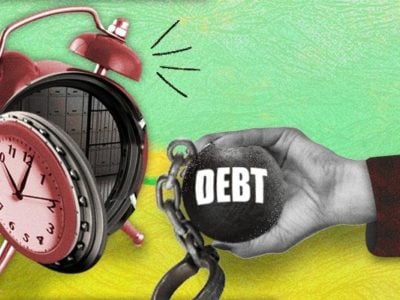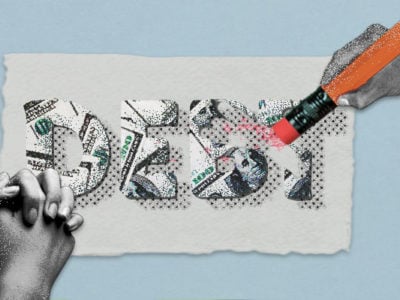Table of Contents
What is debt settlement?
Debt settlement is an agreement you can make with a creditor or debt collector when you’re struggling to pay off your debts. When you settle a debt, your creditor agrees to let you pay it off for less than you owe—in other words, to fully clear the debt despite only making a partial payment.
This has obvious benefits, but also several downsides. For instance, when you settle a debt, your creditor will report it to the credit bureaus. It counts as a negative mark on your credit report, which means that debt settlement will damage your credit score.
Debt settlement also isn’t guaranteed to work. Your creditor also has no obligation to accept your offer of debt settlement. They’re free to negotiate for more money or to reject your offer entirely.
Despite these downsides, debt settlement is still worth trying if you think you won’t be able to pay off your debts otherwise.
How to settle a debt
There are two different approaches to debt settlement. You can negotiate a debt settlement yourself or hire a debt settlement company.
Although working with a company can make the process less stressful, debt settlement companies don’t do anything that you can’t do yourself. They also generally charge a fee (often around 20%–25% of the settled debt).1
If you hire a company to help, you need to be wary of scammers. In particular, beware of any companies that charge unusually low rates or demand an upfront payment (which is prohibited by the Federal Trade Commission under the Telemarketing Sales Rule).2
What kinds of debt can you settle?
You can usually only settle unsecured debt (such as credit card debt). You probably won’t be able to settle debt on a secured loan, which is backed by collateral that your creditor can seize if you don’t follow your repayment schedule.
Realistically, your creditor will only consider letting you settle your debts if you’re offering more money than they’d otherwise be able to get from you. This means that to settle a secured debt, you’d have to offer more than what your collateral is worth.
How does debt settlement work?
The debt settlement process involves contacting either your creditor or debt collector (whoever owns your debt), explaining your situation, and offering to settle your debt, either with a reduced lump-sum payment or through installments.
Your creditor may reject, accept, or counter your offer. If they agree, you’ll begin paying them. They’ll report your arrangement to the credit bureaus, who will update your account to show that the debt is “settled.”
If your debt hasn’t been charged off yet, then you’ll need to finish paying them in no more than 90 days.3 However, if it has been charged off, then you may be able to pay your settlement over a longer period.
How debt settlement companies work
If you choose to work with a debt settlement company, they’ll probably ask you to pay monthly installments into a savings account. You’ll eventually use this money to pay off your debts. They may instruct you to stop making payments to your creditor.
The entire process can take three years or longer, depending on how much you’re able to set aside for this purpose (there will typically be a minimum required monthly payment).3
Beware of the risks of debt settlement
According to a 2017 CFPB report, most credit card issuers refuse to work with third-party debt settlement companies. You might also face late fees, large amounts of accumulating interest, damage to your credit, and even lawsuits as a result of not making payments, so you should reserve debt settlement as one of your last resorts.
How much will a debt collector settle for?
A 2018 report found that on average, consumers who pursued debt settlement paid off their debts for less than 50% of the final amount they owed. However, the exact amount that your debt collector will settle for depends on how much money you owe and how old the debt is.4
Debt collectors often offer better settlement deals for older debts because they’ll usually have paid less for those debts in the first place.3 For example, an analysis conducted by the FTC in 2013 revealed that debt buyers paid an average of 7.9 cents on the dollar for debts that were less than 3 years old, whereas they paid an average of 2.2 cents on the dollar for debts that were 6 to 15 years old.5
Debt settlement pros and cons
Debt settlement might seem like a tempting option when you’re feeling swamped by bills you can’t pay off. It has a lot of advantages, but also several disadvantages that you should consider before getting started.
Advantages of debt settlement
Debt settlement has a few clear advantages that make it a popular option for handling old or large debts:
- You end up paying less money than you owe
- If it’s successful, your debts are cleared—you avoid further collection efforts (which can include lawsuits)
- It saves you from having to declare bankruptcy
Disadvantages of debt settlement
However, debt settlement has some major drawbacks that you need to carefully consider:
- It’ll damage your credit
- Unless you’re able to make an offer right away, the process will likely take two to four years
- Your creditor or debt collector might sue you before you make your offer
- If it doesn’t work, then you’ll end up with much more debt than you started off with (you’ll probably owe 13% or 14% more by the time you settle your debt as a result of accumulated interest and late fees)4
- If you’re going through a debt settlement company, you may have to pay hefty fees
- Any reduction you receive on your debt is usually considered taxable income (e.g., if you settle your debts for $2,000 less than you owe, you’ll have to pay taxes on that $2,000)
Is debt settlement worth it?
Debt settlement might be worth it if you’re out of options, and it’s certainly safer than ignoring debt collectors. However, the repercussions it’ll have on your finances and credit mean it should be one of your last resorts.
If you decide to negotiate for a debt settlement, make sure to confirm that your debt collector is legit first. Also bear in mind that there’s nothing that a debt settlement company can do for you that you can’t do yourself.1 If you do decide to get professional help, then make sure to choose a competent and responsible company.
Alternatives to debt settlement
If you can’t afford to pay your collector, there are several alternatives to debt settlement, most of which involve less financial risk and less harm to your credit. If you’re looking for another way to resolve overwhelming debts, you have four main options.
1. Reach out to a credit counseling agency
Unlike debt settlement companies, credit counseling agencies are usually nonprofit organizations.1
A credit counseling agency will help you create a debt management plan (DMP), which means they’ll negotiate with your creditors to get you extended repayment periods and lower interest rates. They’ll also help you create a budget and a schedule that you’ll follow as you repay your debts.
2. Transfer your balance
If you have a reasonably good credit score but you still have a lot of high-interest debts that you’re struggling to pay off, then you should consider opening a new credit account with a lower interest rate (or an introductory 0% APR) and transferring your debts to it. This is known as a balance transfer.
If you pursue this option, pay attention to transfer fees—this isn’t a good idea if the cost of the transfer would exceed the money you’d save by paying a lower interest rate.
3. Consolidate the debt
If you have multiple debts that you’re struggling to pay off, then you can pursue debt consolidation. Like the previous method, this involves transferring your debts to one account to reduce the overall interest rate you have to pay and the number of payments you have to make each month.
Some lenders offer special, low-interest loans for this purpose, known as debt consolidation loans. After receiving one, you can immediately use it to pay off all your other debts. This means that all you need to do is make a single monthly payment towards the loan itself.
4. Declare bankruptcy
Filing for bankruptcy means declaring that you’re financially insolvent and have no way of paying off your debts. Bankruptcy is extremely damaging to your credit score, but it provides many forms of immediate debt relief.
Bankruptcy is often viewed as an absolute last resort. Having a bankruptcy recorded on your credit report can make it very difficult to get loans and lines of credit in the future. These effects can be long-lasting—some bankruptcies can stay on your credit report for up to 10 years. In contrast, a settled debt will only stay on your credit report for a maximum of seven years.
However, bankruptcy might be preferable to debt settlement if you need immediate (and certain) debt relief. Remember that debt settlement can take upwards of three years to complete, and it’s not guaranteed to work because your creditor or debt collector is entitled to reject your offer.
If you’re faced with choosing between bankruptcy and debt settlement, consider setting up a free consultation with a debt counseling agency to figure out which option is better for you.
Takeaway: Debt settlement is an agreement to resolve your debt for less than you owe
- You can settle your debt on your own (by working directly with your creditor or debt collectors) or by getting help from a debt settlement company.
- Debt settlement doesn’t always work. It also damages your credit score, and because it often involves a period of nonpayment, it opens you up to lawsuits.
- Debt settlement companies can’t do anything for you that you can’t do yourself, and they’re generally for-profit organizations that charge large fees, so you should carefully consider whether getting their help is worth it. You should also be wary of scammers.
- Debt settlement can be worth it if you have overwhelming debt that you can’t pay off, but it should generally be one of your last resorts because of the risks it involves and the damage it’ll cause to your credit.







